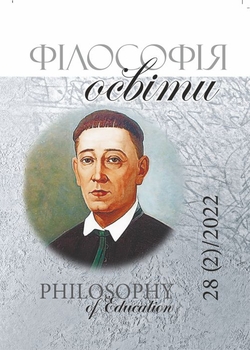Впровадження в університетах наукової освіти і залучення талановитої молоді до науки
DOI:
https://doi.org/10.31874/2309-1606-2022-28-2-6Ключові слова:
талановита молодь, соціальна турбулентність, наука, освіта, наукова освіта, STEM-освіта, STEAM-освіта, мотивація до академічної діяльностіАнотація
Суспільство потребує молодих людей з відкритим світоглядом, готових діяти у нестандартних обставинах і створювати нові алгоритми вирішення суспільних проблем, базуючись на останніх досягненнях науки. Наука також постійно потребує вчасної зміни наукових поколінь, прийняття новим поколінням нового бачення завдань і можливостей науки. Все це має забезпечити наукова освіта, яка наближає молодь до освіти вже на рівні університетів і навіть старших класів школи. Належним чином організована наукова освіта забезпечує належну якість освіченості громадян, яка дозволяє їм адекватно орієнтуватися та самореалізовуватися в нових за аксіологічною матрицею обставинах. В цьому контексті максимально актуальною є якісна наукова освіта, що характеризується такими параметрами, як наукоцентричний гуманістичний світогляд, когнітивна гнучкість, особистісна креативність, пізнавально-гуманістичний творча взаємодія між суб’єктами. В статті розглядаються показові приклади та визначаються ключові напрями ефективного розвитку так званої наукової освіти, STEAM-освіти. Попри те, що принципи та методики наукової освіти мають бути запроваджені на усіх етапах набуття сучасною людиною освіти у режимі освіти впродовж життя, однак саме в університетах наукова освіта може бути реалізована найбільш повно і дати найкращі результати: саме талановита молодь має уже достатньо високий рівень наукових знань і навичок наукових досліджень і водночас ще не стала інституційно ангажованою, а отже й соціально залежною, але навпаки є максимально відкритою до творення нових знань і нових соціальних інституцій. Таким чином, наукова освіта постає не лише як новий потужний чинник мотивації до академічної діяльності, але й як надійний шлях для молоді знайти своє місце у суспільстві і бути авангардом подолання ризиків сучасної соціальної турбулентності.
Посилання
Babijchuk, S. (2018). Scientific education as a pedagogical concept. [In Ukrainian]. Molod i rinok 2(157), 60–63.
Balyk, N., & Shmyger, H. P. (2017). Approaches And Peculiarities Of Modern Stem Education. [In Ukrainian]. Physical & Mathematical Education 2(12), 26–30.
Buriak, O. O. and others. (comp.). (2019). STEM – the world of innovative opportunities: a scientific and methodological guide. Kharkiv: Madrid Printing House. [In Ukrainian]
Dovgyi, S., Nebrat, V., Svyrydenko, D. & Babiichuk, S. (2020). Science education in the age of Industry 4.0: challenges to economic development and human capital growth in Ukraine. Naukovyi Visnyk Natsionalnoho Hirnychoho Universytetu, (1), 146–151. https://doi.org/10.33271/nvngu/2020-1/146
Hotsulyak, Yu. V., & Galchenko, M. S. (2016). Scientific education in Ukraine: theoretical and legal context. [In Ukrainian]. Education and Development of Gifted Personality, (4), 5–11.
Hrynevych, L., Morze, N., Boiko, M. (2020). Scientific education as the basis for in-novative competence formation in the conditions of digital transformation of so-ciety. [In Ukrainian]. Information Technologies and Learning Tools 77(3), 1–26. https://doi.org/10.33407/itlt.v77i3.3980
Khamitov, N. V. (2022). Academic philosophy as science and art. [In Ukrainian]. Reports of the National Academy of Sciences of Ukraine, (4), 59–73.
Kuzmenko, G. V. (2020). From STEM to STEAM education: key aspects based on US gov-ernment initiatives. Education and Development of Gifted Personality, 4(79), 18–24. https://doi.org/10.32405/2309-3935-2020-4(79)-18-24
Mielkov, Y. (2021). The notion of ‘Open Science’: its values and meaning for the higher edu-cation system. Philosophy of Education 27(2), 8-23. https://doi.org/10.31874/2309- 1606-2021-27-2-1
Podliesny, S. V., & Tarasov, O. F. (2019). The relevance of the use of STEM-STEAM-STREAM technologies in the field of engineering and technical education for the sustainable development of the economy of Ukraine. [In Ukrainian]. Visnyk of Vinnytsia Polytechnic Institute (2), 123–131. https://doi.org/10.31649/1997-9266-2019-143-2-123-131
Polihun, N. I., Slipukhina, I. A., & Chernetskyi, I. S. (2018). Scientific education as an inno-vation in the education system of Ukraine. [In Ukrainian]. Scientific notes [Volodymyr Vynnychenko Central Ukrainian State Pedagogical University]. Series: Pedagogical Sci-ences, (168), 186–189.
Polihun, N. I., Postova, K. G., Slipukhina, I. A., Onopchenko, G. V., & Onopchenko O. V. (2019). Implementation of STEM education in conditions of integration of formal and informal education of gifted students: methodical recommendations. Kyiv: Institute of the Gifted Child of the National Academy of Sciences of Ukraine. [In Ukrainian].
Yakman, G. (2010). What is the point of STE@M? A Brief Overview. https://steamedu.com/ wp-content/uploads/2016/01/What_is_the_Point_of_ STEAM_A_Brief_Overv.pdf
##submission.downloads##
-
PDF
Завантажень: 254
Опубліковано
Як цитувати
Номер
Розділ
Ліцензія

Ця робота ліцензується відповідно до Creative Commons Attribution 4.0 International License.
- Автори, які публікуються у цьому журналі, згодні з такими умовами:
- Автори зберігають авторське право і надають журналу право першої публікації;
- Автори можуть укладати окремі, додаткові договірні угоди з неексклюзивного поширення опублікованої журналом версії статті (наприклад, розмістити її в інститутському репозиторії або опублікувати її в книзі), з визнанням її первісної публікації в цьому журналі.





